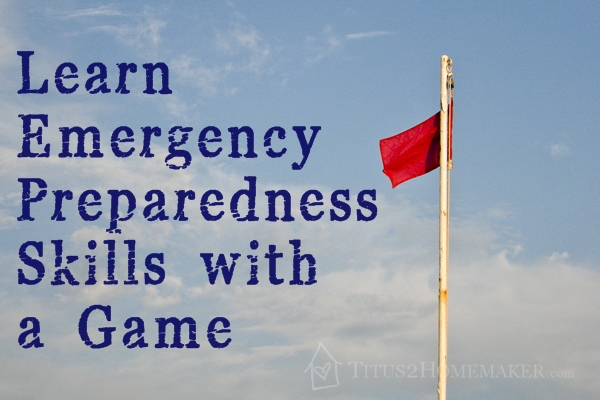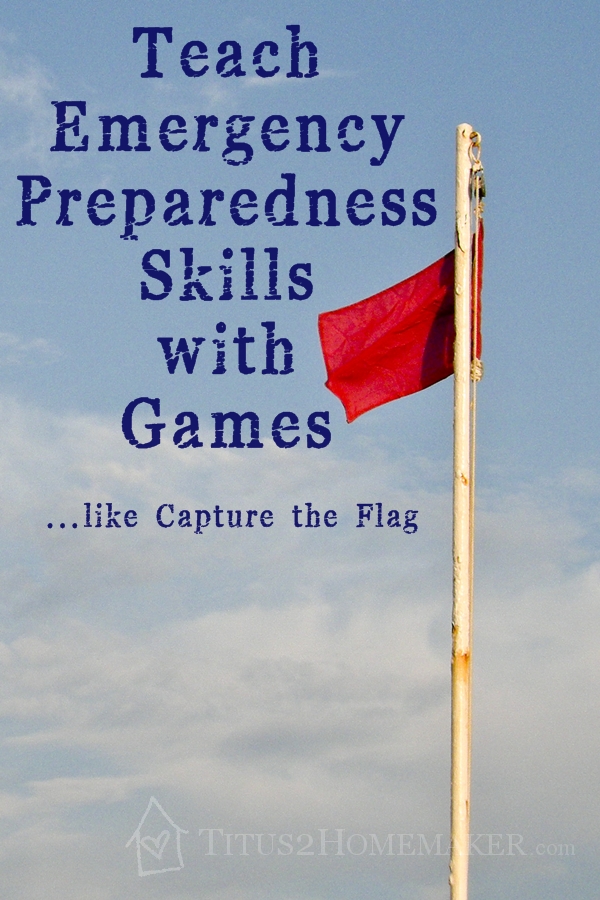by Lee Flynn
Preparing kids for emergencies is a tough job. One way to approach emergency preparedness is to associate it with a game like Capture the Flag.
Capture the Flag (CTF) is classic because one skill alone does not determine the winner – brains, power and luck all play a part. Each team has a safe zone with a flag. The object is to capture the other team’s flag. To win in an emergency, you must have a strategy and basic skills.
Teach your kids to play CTF. Play with them. Be sure they know what words like “safe zone,” “allies” and “team” mean. Explain that your family is like a CTF team and that you must work together. Talk about sticking with their allies and nourishing themselves to stay strong so they can capture the flag.
Fire
Using CTF imagery, have your kids determine a safe zone in case of a house fire. Plan exits and practice using them. Designate a neighbor or other safe place to meet. Show the kids precautions you have taken – smoke detectors, fire extinguishers, etc. Check out library books to read together to reinforce the lessons.
Medical
Once your children speak well, teach them about 911. Explain that it is only to be used in serious situations, not for scrapes or bruises. If you sometimes leave your children home alone, teach them to use 911 by play-acting. Be sure they know your address. Have them practice speaking slowly and clearly.
Natural Disasters
No matter where you live, you face natural disaster. A family in Florida, for example, should take the time to educate their children about hurricanes. Television stations often offer free tracking maps full of useful information during hurricane season. Whether it’s hurricanes, tornadoes, or earthquakes, give your kids the basic facts. If you face earthquakes or tornadoes, you have little warning. Talk about the need to be prepared no matter where everyone in the family is located.
At Home
Use checklists available from a variety of websites to help determine what your family might need for 7-10 days if you were to lose power. Have the kids think about emergency food, special toys, books or games and items other family members might need.
If you are not a camping family, plan a “Little House” type weekend at home. Use no electricity or running water and figure out how to cook and entertain yourselves. After the weekend, rethink your list and make adjustments. Ask yourselves, “How would Laura Ingalls CTF?”
Away From Home
Emergencies can happen anytime, anywhere. Do your kids know what to do if they are lost? In a crowd situation, have them find someone who looks like a mom and ask her for help. Let them know you will be looking for them.
Reassure your children that while emergencies are rare, they should be prepared. As soon as they are of school age have them carry boxed water, an emergency food supply, a small flashlight and a whistle in their backpacks in case something does happen that keeps them away from home. Let them see that you have your own backpack in your car. Talk about allies like teachers, emergency workers, etc.
With children old enough to participate in activities away from home, discuss how they would get home in an emergency and when it is best to stay in place. Consider giving children this age inexpensive, preprogrammed cell phones.
The Winning Team
Emergency preparedness is an ongoing process. As your children grow up, encourage them to learn skills that will help them survive in any situation. Not only will this build their confidence, it will make your “home team” that much stronger. Continue playing Capture the Flag and continue talking through a variety of “what if” situations. As you are teaching them, you are replacing fears with knowledge that will help your children for life.


Leave a Reply